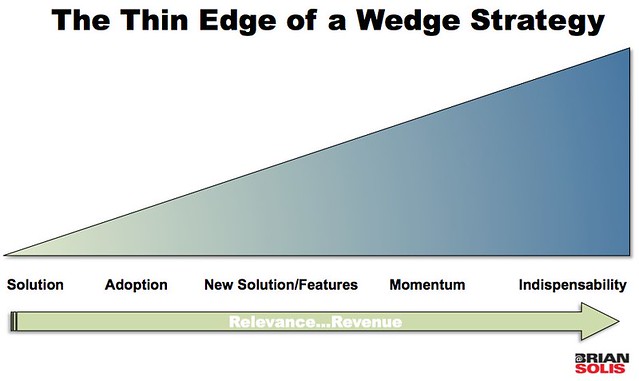
I pay attention to emerging technology and trends on a daily basis. While I track many networks, tools, and services, I take the time to share those that appear to gain traction or offer interesting prospects for tomorrow’s business, today.
Two such services are quickly becoming the darlings of the blogosphere and brands alike, Instagram and Quora. Not a day passes us by where someone isn’t analyzing Instagram’s rise to imaging stardom or Quora’s domination of social engagement around questions and answers. Did the world need another imaging application? Probably not. Do consumers need another question and answer site? Hardly. Instagram and Quora, however, appear to have executed a “thin edge of the wedge” strategy, which is akin to the “tip of the spear” strategy where the services attack a small problem first and then expand once traction and momentum are underway.
Instagram wasn’t the first service to help you share pictures from your mobile device to your social graph. Services such as Twitpic and yfrog connected pictures to the Twitter stream. With Facebook’s mobile app, users could simply upload pictures to their Wall. Instagram however, solved two small challenges with an all-in-one app. It became the focal point of visual sharing. Rather than take a picture and then upload socially through a separate service, Instagram became the dashboard for capturing, editing, and sharing the image without leaving the app. And, Instagram served as an integrated distribution network connecting users to their respective egosystem including, Twitter, Flickr, Tumblr, Posterous, Facebook, and Foursquare. The answer to what’s next lies in the company’s business plan, most likely described as the wedge strategy. Or, the answer could already exist in Quora, the social Q&A network.

Quora seems to baffle the sharpest of the pundits. Essentially it is a question and answer network, not unlike Yahoo Answers or Mahalo Answers. But, the fledgling service solved a couple of problems very well that existing solutions and budding entrepreneurs neglected to see. Much in the same way Foursquare applied game mechanics into geolocation and Facebook introduced the social effect into the News Feed, Quora is designed to engage, challenge, educate and reward its users. But that’s not all. The foundation for the questions and answers are driven by a hierarchy and social ranking, much like Twitter and blogs. The number of followers, following and total mentions is prominent for all to see and judge.
Quora evokes the essence of social capitalism and in the process, introduced a new category of content creators. The system was initially closed, and through a strategic round of private beta invitations, the early rounds of users such as digerati, silicon valley elite, bloggers, celebrities, et al, set the stage for exclusivity as well as focus. Those on the outside wanted in and those on the inside desired recognition. I am not name dropping, but I am making a point. I was introduced to Quora by Ashton Kutcher. And, when I sat down recently to discuss Quora with uber blogger Robert Scoble, his response was as telling as it was validating, Quora is hot because, “all of the cool kids are using it.”
The thin wedge of Quora’s strategy may already have traveled further from the left to the right than Instagram. As new users are invited into Quora, the game mechanics seem to only grow in prominence. People are investing in asking and more so, answering questions to boost social capital in an uncharted and unconquered network where the reward is distinction and stature.
Are Businesses Using Instagram and Quora to #Engage?
If it’s one thing that I’ve learned over the years of studying social media, business, and the pursuit of influence, it’s that we are competing for the moment in order to earn and maintain a semblance of relevance. For businesses struggling to gain traction through Likes, RT’s, comments, clicks, friend and follower counts, the moment for which we compete, never really comes. It is perpetual.
The reality is this, Quora and Instagram are inviting participation among brands as they experiment in earning relevance.
#Quora
While brands are currently not invited to the Quora party, listening and monitoring are important within Quora if it is indeed where your community is asking and answering questions. Like Yahoo Answers and Mahalo Answers, answers to brand related questions are already populating the top of search results in Google.
But why Quora? Robert Scoble eluded to the value of the network earlier. The community as it exists today is rich with influencers. Their perspective is worthy of attention. If for nothing else, insight into the perception and experiences of noteworthy individuals can help inspire future experiences through adaptation.
Brands can follow topics related not only to their company, but also their markets. For example, there are hundreds of questions related to Apple in Quora right now, 335 of which are open. If we take a subset of Apple’s business and follow the topic around “tablets,” we would see that our time (defined by any number of tablet manufactures) would yield a great deal of insight.
Even though brands aren’t invited to the party, brand representatives are already listening and responding to important questions related to their company or market using their personal accounts. This does two very important things. 1) It allows for individuals to build social capital because of the caliber and thoughtfulness of the responses they share. 2) Through transparency, brands are the indirect beneficiary as these representatives establish goodwill with each insightful and helpful answer.
Quora offers insight into several essential ingredients for cultivating a relevant brand:
– Intelligence (business and competitive)
– Sentiment/Perception
– Advocacy
– ORM (Online Reputation Management)
By the way, if you want to continue the conversation on this topic, it should come as no surprise, that a question already exists…and it’s awaiting your response.
On the other hand, Instagram is already attracting brands into the popular mobile imaging network to help visualize their stories. In November of 2010, National Geographic was amongst the first to demonstrate how a brand’s image could quite literally tie to images within a mobile photo sharing network bound by imagery.
Since then, CNN, Grammys, NPR, NBC News, Playboy, and Pepsi signed up for Instagram. When Starbucks introduced its new logo recently, the company did not wish to repeat the Gap’s social backlash. Instead, Starbucks shared the logo across the social Web, Instagram included, to seek feedback.

NPR uses Instagram to not only extend the reach of its stories, but also tell stories through modern form of photojournalism. In fact, media certainly has a play here and in any other active imaging network.

To learn more about brands using Instragram, you might want to watch this thread as it unfolds on, you guessed it, Quora.
We’re early on both fronts, but these trends are inciting notable activity on both sides of the brand equation. It’s not just businesses that gain from the intelligence and community within each network, media organizations can also keep their fingers on the pulse of not just new, but also emerging networks that can modernize and reinvigorate news distribution networks.
The networks that gain greatest prominence in these times are those that people choose to support. As such, it is up to businesses and organizations with a story to tell and those with true intentions of community to survey the horizons for the next opportunity to earn relevance.
Connect with Brian Solis on Twitter, LinkedIn, Facebook
![]()
___
If you’re looking for a way to FIND answers in social media, consider Engage!: It will help…

___
Get The Conversation Prism:

___
Image Credit: Shutterstock







Brian, how does human capital fit into this? I do Quora, and even answering two or three questions takes a long time – you want to give a solid answer, serious insight. I do it not so much for social popularity, but because I like to answer questions.
It seems to me that brands will succeed in these forums with crowdsourcing, but at some point, we have to give up one platform to tackle another. I am fascinated with Quora and try it almost every day, but at an expense. As the questions grow, the amount of time to sift through and answer them will.
Paul, there is definitely an incentive to those who spend time to answer questions, earn votes, and gather followers. However, as is, it isn’t scalable…but it is fascinating to watch it try.
Brian, how does human capital fit into this? I do Quora, and even answering two or three questions takes a long time – you want to give a solid answer, serious insight. I do it not so much for social popularity, but because I like to answer questions.
It seems to me that brands will succeed in these forums with crowdsourcing, but at some point, we have to give up one platform to tackle another. I am fascinated with Quora and try it almost every day, but at an expense. As the questions grow, the amount of time to sift through and answer them will.
I agree with Paul that a major point missing here is human BANDWIDTH. I recently wrote a post analyzing Quora from a personal standpoint (http://bit.ly/dIvOZ7) and to my surprise the reader comments were almost uniformly negative because of the time it takes to engage and process on this long-form forum.
You say in your post that the platforms will only thrive if there are people there to support them. I’m not sure any more. The SEO gamesman are already descending on Quora. The platform may be able to survive simply as a means to provide a constellation of backlinks and keywords!
I’m sure there will be a segment of the population who thrives in this environment, and I do see tangible personal and business benefits from the platform but I wonder about its long-term success when most people (myself included) seem to ahve a 140-character attention span?
Mark, well said. The point about bandwidth isn’t missing, it’s intentionally left out. That’s a whole different conversation that I can tackle separately. As I mentioned to Paul, part of my role is to study interesting trends. There’s much to learn in the expansion and contraction of networks, whether they’re long or short term. However, to be clear, I am not instructing businesses to go everywhere. There was a post several years ago that still chides me today that read, “the top 50 networks your brand must participate in to stay alive.” It was unrealistic and wrong. As I mentioned to Lee Odden is his post today, “There is no market for your messages. Become a resource for your communities in your communities.”
http://www.toprankblog.com/2011/01/content-marketing-tips-5/
Mark, I’m not surprised Quora can be gamed.
If you haven’t followed Stackoverflow, that’s another very promising forum… which can also be gamed. One way is that there material gets scraped and “optimized” by at least two other sites, many of which are now ranking higher than SO in SERPs.
Another way it can be gamed is socially. Users with enough status are right, even when they’re wrong. I won’t make any definite claims because I’m not prepared to back up my assertions with links. If that sort of thing interests you, find a topic area in your expertise and watch it evolve.
You mention that brands should monitor Quora – does this have to be done manually, or can social media monitoring systems handle this?
Does instagram have plans for an Android ap?
I don’t know this, but I’m assuming that it’s in development. It would help them move from the left to the right of both the wedge and the adoption bell curve.
Good post. Its interesting how you show these new entrants picked one particular focus first, and that that really well beofre expanding and adding more and more services. A good lesson for all new startups to be the best at something before trying to be the king of everything.
Fascinating piece, thank you.
When they’re using Instagram, many people are in a positive frame of mind, enjoying the “fun” aspect of it. When they’ve come across brands within that environment, they seem to have responded very well.
As you’ve said however, people in this context expect engagement and not message. It’s down to the humans with the company iPhones as to how well they meet those expectations, and the other Instagram users know that. I was about to write that it’s a level playing field, but I think actually the advantage is with the existing Instagram users who have already learned to navigate this unconventional network. They’re welcoming the brands to the party and they’re being extra-nice to them because they’re sensitive to the brands being the new kids. There’s certainly an opportunity for a brand to engage meaningfully in those conditions, but again that does come back to the scalability discussed below.
Instagram on the web will presumably change the above. Firstly, and sorry for stating the obvious, the demographic is set to move beyond iPhonographers. Even the existing users will be using it at different times during their day, in different frames of mind so to speak, and so the brands may wish to rethink their terms of engagement once more.
Secondly, as soon as the first read/write Instagram web app opens its doors then the network will be accessible to automated marketing tools a la Twitter. We kind of know where that conversation then takes us.
It is interesting to see Quora evolve. I wasn’t aware of their exclusivity strategy, but it’s a clever one. I agree they’ve built in a social system that makes you want to answer questions, providing numbers and a kind of stature that is psychologically rewarding. Right now, I see them hindered by UI issues. I’ve found it quite cumbersome to enter the detailed responses required to really answer questions adequately. I find it difficult to track new questions in the topic areas I care about. And I find too many single-sentence, not very helpful responses to questions. These problems are probably showing up now as the volume of users grows, but Quora will need to improve the UI and provide better ways of showing the best answers or getting users to participate more in answer ranking, if it wants to grow.
Definitely like the tip of the spear allusion and I definitely think Quora is more than halfway across that figurative spear now.
Their concept is unbelievably firm at this point; the fact that it still continues to grow despite being in a very beta-ish format is proof that the functionality alone is selling.
I can only look forward to seeing how it further evolves from here.
My first only experience with Quora was on a Calacanis thread which went “usenet” within 5 comments.
I deleted my post and deleted my account.
Nothing against Quora per se. At the time (this was a while back), I had not heard of it, it was totally new to me. But that usenet smell was very familiar… I should try it again. No sense in letting a troll put one off of a good tool.
Nice work, Brian. I wonder what will happen with Quora if/when all the cool kids stop using it. Has it already reached the spot where it is growing on its own strength? Or will it whither as people find other platforms to expend one of the most precious commodities of all — their time. At the heart of this answer is content. If Quora provides exceptional content that benefits both those querying and those answering, it will deserve to thrive.
It’s interesting, because it’s a hybrid of wikipedia and Answers, but it has an element of hierarchy built in. I’m certainly watching…
Coming from a brand perspective, I’ve been wary of how to approach Quora. I’ve answered a few questions that were of personal interest to me, but I’ve been hesitant on how to answer questions that pertain to my company. There are a lot of questions on Quora that focus around social media monitoring tools and solutions, some that mention specific software, like Sysomos. I don’t want to get in there and start pitching our product because I feel like that’s not what people would want me to do, even if a question is kind of asking me to.
So far I’m just following questions that pertain to my industry and company and I will help to vote up an answer or thank someone for recommending Sysomos in their answer, but I’ve yet to actually respond and talk about us.
What do you think Brian? What would be a good way for brands to go about using this service (I mean besides keeping a pulse on their industry as you said above)? If brands start answering questions and pushing their products on Quora, will that “ruin” it? I’d be interested to hear what you think about that.
Cheers,
Sheldon, community manager for Sysomos
You are a good man Sheldon. Take a look at this thread and you will see vendors in there, not promoting, but shaping impressions: http://www.quora.com/What-determines-influence-Is-it-a-calculated-score-fan-numbers-or-something-else
Cool examples on Instagram usage. But what about Quora?
i’m instagram fan usage but never heard about quora before ! I will try now thanks for ur good article sharing 🙂
nice post! thanks for the info about instagram and quora!..
Two of my favorite new startups! Nice post.
Thanks this post..
keep writing your blog will be more attractive. To Your Success!
Brian
Great post – and well noticed about people from companies speakingon issues. In my mind, banning organisations is a powerful choice by Quora – forcing more honest conversations at the very minimum.
Azeem
Well said Azeem…
The analogy of the thin end of the wedge is apt Brian. Web services and apps such as Quora and Instagram are getting to a granular level because of the time and investment to come up with the next ‘big idea’ indicative of the last dot-com bubble.
Rather having a simple and quick to market solution means less risk if there is a lack of adoption…you just move onto the next idea.
But once you have a successful idea it’s at that point the thin wedge strategy graph becomes the distinguishing feature between success and failure.
Quora is solving the problem that Google’s been trying to solve forever – creating the database of intentions.
Quora takes a huge leap towards solving this by helping me with “what question do I ask to get the best answer” because someone has probably already taken the time to craft an intelligent and well-formed question to extract the best quality answers, and other clever people have decided what the best answer is.
More here http://bit.ly/g9dIye
I have never come across a brand that give good and most importantly true feedback on its products, when I wanted to purchase it. I think the person or company or brand that does this, will be the best to purchase.
Nice post!
Great post.We got some info.Thanks for sharing…
I’ve answered a few questions that were of personal interest to me, but I’ve been hesitant on how to answer questions that pertain to my company. There are a lot of questions on Quora that focus around social media monitoring tools and solutions, some that mention specific software, like Sysomos. I don’t want to get in there and start pitching our product because I feel like that’s not what people would want me to do, even if a question is kind of asking me to.
The brand equation. It’s not just businesses that gain from the intelligence .
The foundation for the questions and answers are driven by a hierarchy
and social ranking, much like Twitter and blogs. The number of
followers, following and total mentions is prominent for all to see and
judge.
Quora offers insight into several essential ingredients for cultivating a relevant brand: